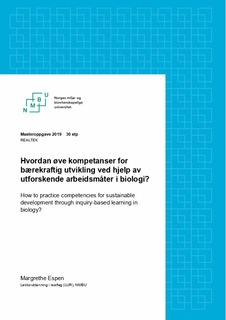| dc.contributor.advisor | Bjønness, Birgitte | |
| dc.contributor.advisor | Iversen, Elisabeth | |
| dc.contributor.author | Espen, Margrethe | |
| dc.date.accessioned | 2019-08-12T09:25:51Z | |
| dc.date.available | 2019-08-12T09:25:51Z | |
| dc.date.issued | 2019 | |
| dc.identifier.uri | http://hdl.handle.net/11250/2607867 | |
| dc.description.abstract | Med Kunnskapsdepartementets varslede inkludering av temaet bærekraftig utvikling i Fagfornyelsen ønsket jeg å være med på å utvikle praksisnær kunnskap om Utdanning for bærekraftig utvikling (UBU), og som lærerstudent forberede meg på tematikken til jeg selv skal undervise i skolen. Jeg har valgt å undersøke hvordan man kan øve noen utvalgte kompetanser for bærekraftig utvikling ved hjelp av utforskende arbeidsmåte som undervisningsmetode i biologi. Det er i UBU-litteraturen beskrevet et mangfold av kompetanser for bærekraftig utvikling, men for å avgrense oppgaven har jeg tatt for meg kompetansene: kritisk tenkning, kreativitet, samarbeid og kommunikasjon, og systemforståelse.
Problemstillingen til oppgaven er: hvordan øve kompetanser for bærekraftig utvikling i biologiundervisning ved hjelp av utforskende arbeidsmåter?
Datamaterialet er hentet fra kvalitative intervjuer tilknyttet UBU og utforskende arbeidsmåte med lærer, lærerstudent og en gruppe med elever i skolefaget Biologi 2. Det er også gjennomført observasjon. Datamaterialet er analysert ved hjelp av tematisk analyse. Dette resulterte i interessante funn, blant annet elever, lærer og lærerstudents forskjellige syn på og forståelse av hva kompetanser for bærekraftig utvikling er og hvordan disse bør øves. Videre viser funn i studien at begrepet kompetanser for bærekraftig utvikling er uklart for lærerstudent og elevene, og at de forstår kompetanser slik det er framstilt i læreplanen. Lærer har bredere forståelse av kompetansebegrepet knyttet til UBU.
Funn i studien tyder på at det er gode argumenter for å øve kompetanser for bærekraftig utvikling ved hjelp av utforskende arbeidsmåter. Studien viser at elevene øver kompetansen kreativitet når de ser flere sider av en sak og finner argumenter som både er for og mot saken. Kompetansen kritisk tenkning øves gjennom argumentasjon og det å være kritisk til informasjon (kunnskap). De tre kompetansene kritisk tenkning, kreativitet og systemforståelse øves når elevene knytter kunnskap til sitt virkelige liv og ser kunnskapen i sammenheng med annen (og tidligere innlært) kunnskap. Kompetansen kommunikasjon og samarbeid øves når elevene arbeider i gruppe, og særlig kommunikasjon øves når elevene finner argumenter og diskuterer disse i gruppe. Alle de fire kompetansene øves når elevene diskuterer, hvor de vurderer informasjon (kunnskap) som blir tilført diskusjonen som argumenter og fortløpende analyserer disse. | nb_NO |
| dc.description.abstract | With the Ministry of Education's announced inclusion of the theme of sustainable development in «Fagfornyelsen», I wanted to contribute to developing practice-related knowledge about Education for Sustainable Development (ESD), and as a teacher student prepare myself for the theme before I will teach at school. I have chosen to investigate how one can practice some selected competences for sustainable development by assisting inquiry-based learning as a strategy in biology education. A variety of competences for sustainable development have been described in the ESD-literature, but in order to delineate the thesis I have focused on the competencies: critical thinking, creativity, collaboration and communication, and system-thinking.
The issue for this study is: how to practice competencies for sustainable development in biology teaching using inquiry-based learning?
The data material is taken from qualitative interviews associated with ESD and inquiry-based learning with teacher, teacherstudent and a group of pupils in the school subject Biology 2. Observations have also been carried out as part of the data material. The data material has been analyzed using thematic analysis. This resulted in some interesting discoveries, including pupils, teacherstudent and teachers' different views on and understanding of what competencies for sustainable development are and how these should be practiced. Findings in the study shows that the term associated with ESD is vigilant for teacherstudent and pupils, and it may seem that they largely associate it with the term of competence as it appears in today's curriculum and not similar to what appears in the ESD- literature.
Findings in the study indicate that there are good arguments for enhancing competencies for sustainable development through inquiry-based methods. Pupils practice creativity when they see several aspects of a case and find arguments that are both for and against it. Critical thinking is practiced through argumentation and being critical of the information (knowledge) that is brought to the argumentation. The three competences critical thinking, creativity and system-thinking are practiced when the pupils associate knowledge with their real-life experiences and see the knowledge in the context of other (and previously learned) knowledge. Communication and collaboration are practiced when the pupils work in groups, and especially communication is practiced when the students found arguments and discussed these in the group. All four competencies are practiced when the students discuss in a group where they consider information (knowledge) that emerges and continuously analyzes arguments in the discussion. | nb_NO |
| dc.language.iso | nob | nb_NO |
| dc.publisher | Norwegian University of Life Sciences, Ås | nb_NO |
| dc.rights | Attribution-NonCommercial-NoDerivatives 4.0 Internasjonal | * |
| dc.rights.uri | http://creativecommons.org/licenses/by-nc-nd/4.0/deed.no | * |
| dc.subject | Utdanning | nb_NO |
| dc.subject | Education | nb_NO |
| dc.title | Hvordan øve kompetanser for bærekraftig utvikling ved hjelp av utforskende arbeidsmåter i biologi? | nb_NO |
| dc.title.alternative | How to practice competences of sustainable development through inquiry-based learning in biology? | nb_NO |
| dc.type | Master thesis | nb_NO |
| dc.subject.nsi | VDP::Humaniora: 000 | nb_NO |
| dc.description.localcode | M-LUN | nb_NO |

